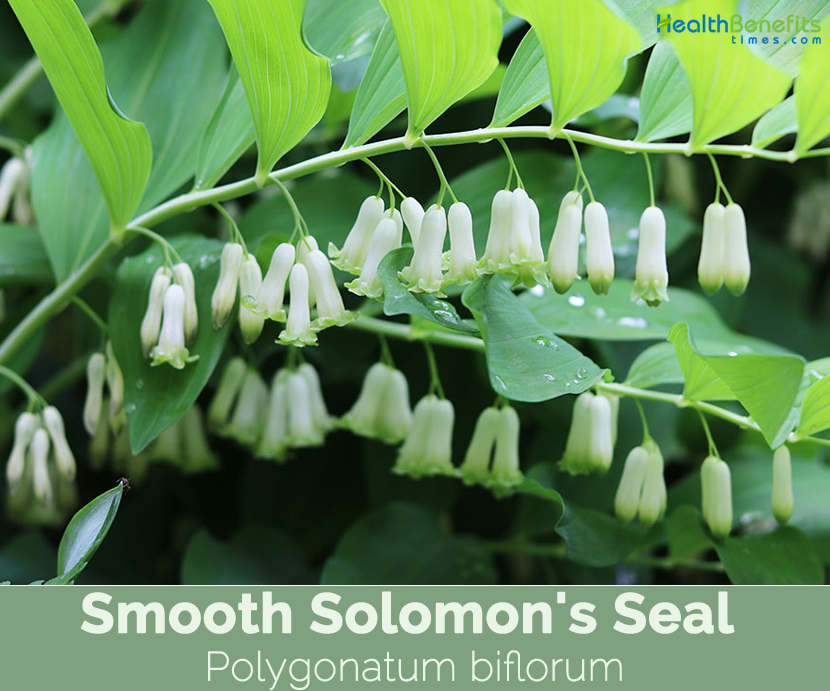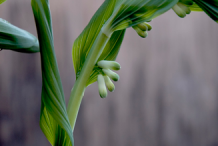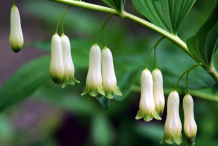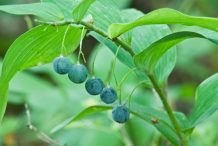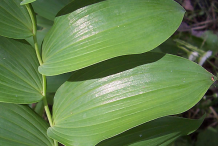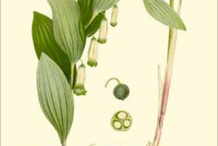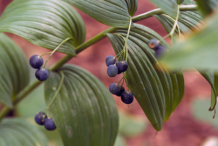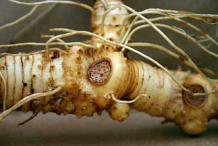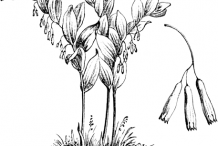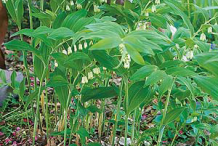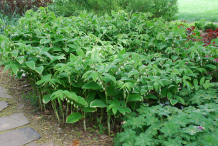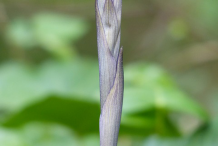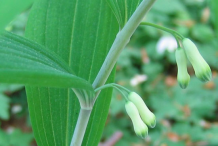Plant Description
Smooth Solomon’s seal is a rhizomatous, herbaceous unbranched, upright, arching, perennial herb that grows about 1 m (3 ft. 3 inches) tall and 0.3 m (1ft in) wide. The plant is found growing in moist to slightly dry deciduous woodlands, lower wooded slopes, edges of shady seeps, young flat woods, woodland borders, and fence rows that are overgrown with shrubs or trees, meadows near woodlands and open prairies, especially cemetery prairies. It occurs in both high quality and degraded woodlands. The plant grows well in sandy, loamy and clay soils but prefers well-drained soil and can grow in heavy clay soil. It prefers moist soil. It can also grow in acidic, neutral and alkaline soils. The root system produces rhizomes that are rather stout and knobby; on the upper surface of these rhizomes, there are circular scars. This plant often forms clonal colonies. Stems are thick and white, twisted and full of knots, with circular scars at intervals, left by the leaf stems of previous years.
Leaves
Alternate leaves are up to 6 inches long and 3½ inches across. They are spaced fairly close together along the stem. These leaves are pale green, elliptic to ovate in shape, smooth (entire) along their margins, and glabrous. They have parallel veins and clasp the stem.
Flowers & Fruits
Flowers are about ½-¾ inches (13-18 mm.) in length. Each flower has a narrow tubular corolla that is whitish green or pale yellowish green. Along the outer rim of this corolla, there are 6 small lobes that are slightly recurved. Within the interior of the corolla, there is a pistil with a single style and 6 stamens. Each flower is replaced by a small globoid berry that is about 8-10 mm. across about the size of a pea containing about three or four seeds. These berries are initially green, but they ultimately become dark blue-violet.
Health benefits of Smooth Solomon’s Seal
Few of the popular health benefits of Smooth Solomon’s Seal are mentioned below
1. Great for Joints
Solomon’s seal root is great for repairing cartilage, tendons, and ligaments, thus making it great for anyone with joint problems. It also tightens loose joints, and encourages the production of joint fluid.
2. Soothes GI Tract
Solomon’s seal root also soothes away irritation of the GI tract. When we have GI tract irritations and diarrhea this great herb helps to calm down the GI tract and make all the mucus membranes soothed and peaceful again. Solomon’s seal consists of mucilaginous compounds those sooth away irritations in the GI tract.
3. Expectorant
While it is particularly effective for a dry cough, Solomon’s seal tea can be used to treat any type of cough, respiratory infection, or lung congestion. Since it is also a demulcent, it coats the throat and helps relieve the irritation causing a cough. Historically, the tea has even been used to treat conditions like tuberculosis, pulmonary consumption, and bleeding of the lungs, but these types of uses must necessarily be discussed with your doctor or health practitioner.
4. Mild Diuretic & Detoxifier
Solomon’s seal Tea makes you pee more, though not excessively. It promotes the formation of urine by the kidney and may aid in flushing the body of toxins and excess water, and breaking down fat. If you drink the tea in the evening, you may wish to drink it early enough that you’re not waking up in the middle of the night to use the bathroom.
5. Anti-inflammatory
Solomon’s seal is a wonderful anti-inflammatory herb helping with irritation, redness, swelling, and pain in every part of the body. Solomon’s seal consists of allantoin which is a great anti-inflammatory agent which has been used in modern anti-inflammatory lotions.
6. Lowers Blood Pressure
Solomon’s seal helps to lowers and regulates blood pressure. It contains convallarin which is a good heart regulator thus helping to with atrial fibrillation and congestive heart failure.
7. Women’s Issues
Solomon’s seal is an excellent remedy for women’s issues. Regular use of the tea (or tincture) can help to ensure abundant reproductive secretions, heal inflamed vaginal tissue, and ease vaginal dryness (particularly common for post-menopausal women). Solomon’s seal is also “nourishing and building for women who wish to conceive, for new mothers, for women who feel overworked and stressed, and for women experiencing menstrual cramps or going through menopause or post-menopause. That list includes just about every woman we know.
8. Cardiovascular Regulation
Solomon’s seal is known to have a mild regulating effect on the heart muscle because it contains small, safe amounts of the substance convallarin, a cardio glycoside. The National Institute of Health is presently researching Solomon’s seal’s effectiveness in lowering high blood pressure. Herbalist Matthew Wood says it can be safely used as a mild heart tonic. If you are pregnant, have low blood pressure, or are on heart medication, it is not recommended that you use Solomon’s seal without consulting your doctor.
Traditional uses and benefits of Smooth Solomon’s seal
- It has been used in the treatment of indigestion, profuse menstruation, lung ailments, general debility etc.
- It is a folk remedy for piles, rheumatism and skin irritations.
- Poultice or a decoction of the fresh roots is applied to cuts, bruises, sores etc.
- It is good in inflammations of the stomach and bowels, piles, and chronic dysentery.
- Strong decoction given every two or three hours has been found to cure erysipelas, if at the same time applied externally to the affected parts.
- Powdered roots make an excellent poultice for bruises, piles, inflammations and tumors.
- Bruised roots were much used as a popular cure for black eyes, mixed with cream.
- Decoction of the root in wine was considered a suitable beverage for persons with broken bones, ‘as it disposes the bones to knit.’
- It is a great remedy for providing relief from injuries, gastrointestinal issues, issues related to women and many more.
- Many people apply this medicinal herb straight to the skin for getting rid of blemishes, acne, and pimples.
- It also works to soothe irritated and itchy skin caused by bruises and also helps to heal these bruises.
- If an individual is suffering from boils then it can be cured naturally with the help of this versatile herb.
- It works magically to protect from sun damage and heal damaged skin.
- Its anti-bacterial properties can help heal all kinds of wounds quickly.
- If someone is suffering from dry cough, then this tea provides immediate relief by soothing the throat.
- Solomon’s seal tea relieves a person from the pain associated with respiratory infection.
- It has the potential to cure tuberculosis too.
- This herb can also assist in the treatment of lung bleeding.
- Menstruation cramps can be reduced by consuming this herbal tea.
- This herb also helps heal the body of a woman after child birth.
- For women who are trying to conceive, this woodland herb can improve fertility and chances of conceiving quickly.
- This tea works as a stress reliever for working women who struggle to balance work and home.
- It is effective in reducing blood pressure and regulates heart muscles.
- It is used by athletes in its tincture form to prevent muscle and ligament problems.
- If a person suffering from weak and brittle hair massages this multipurpose herb on the scalp.
- Solomon’s seal root is great for repairing cartilage, tendons, and ligaments… thus making it great for anyone with joint problems.
- It also tightens loose joints, and promotes the production of joint fluid.
- It also lowers blood sugar levels making it great for diabetics.
- Decoction can also be used as a facial rinse to help fade blemishes or for poison ivy and similar skin problems.
- Fresh root, pounded and applied topically helps fade bruising.
- Bruised roots were much used as a popular cure for black eyes, mixed with cream.
- Solomon’s seal root tea is a good tonic acting on the kidneys, heart and sexual organs as well as soothing the digestive system.
- An infusion can be used for profuse menstruation and internal bleeding, indigestion and other stomach and digestive complaints including ulcers, bowel problems and hemorrhoids.
- It is also great for torn ligaments, dislocations and other issues with joints.
- It is used mainly in the form of a poultice and is believed to prevent excessive bruising and to stimulate tissue repair.
- Root is antiperiodic, antitussive, cardio tonic, demulcent, diuretic, energizer, hypoglycemic, ophthalmic, resolvent, sedative and tonic.
- It is used in the treatment of, dry throat, dry coughs and coronary heart disease.
- It can also be applied externally as a poultice to treat bruises small wounds etc.
- It has also been used to remove freckles.
Culinary Uses
- Young shoots are consumed raw or cooked.
- It is an excellent vegetable when boiled and used as an asparagus substitute.
- Roots are rich in starch, this can be extracted by beating or grinding the dried root, the starch can then be used to make bread or can be mixed in other foods such as soups.
- Native Americans consumed the starch-rich rhizomes of smooth Solomon’s-seal as a “potato-like food” used to make breads and soups.
- Young leaves are edible but relatively unpalatable.
Hot Infusion
Solomon’s seal has a mild, slightly sweet, nutty taste, so you will probably find it quite easy to drink.
To make 1 cup of hot tea:
- Place 1/2 teaspoon of chopped/ground root in an empty cup
- Boil tea water, wait a minute or two before pouring it into your cup
- Cover and steep for 7-10 minutes
You don’t need a tea ball or strainer because the root simply sinks to the bottom and swells up. You can chew on the swollen root bits— it won’t hurt you .
You can drink two or three cups a day, as needed, but you may find that one cup per day is enough. Never drink more than three cups in a day.
Cold Infusion
You will get even more benefit from the tea if you make a cold infusion
More of the soothing, demulcent (mucilaginous) qualities are drawn out of the herb when it soaks overnight.
You can make a quart at a time, if you like.
To make one quart of cold tea:
- Place 2 teaspoons of Solomon’s Seal Root in a clean quart jar (1/2 tsp per cup)
- Fill with water and allow to sit overnight at room temperature. It will be ready to drink the next morning.
- Store in the refrigerator to keep fresh.
Sip throughout the day, or re-warm as needed, but do not bring to a boil. Don’t make more tea than you can drink in a day or two.
Other Facts
- Root has been burnt as incense.
- It is said that when the root is burnt in the bedroom just before going to sleep, the person would sleep soundly and awaken refreshed, rested and feeling young.
Precautions
- Fruit and seed are possibly poisonous.
- In normal doses Solomon’s seal is very safe, but should not be taken by those who are pregnant or nursing.
- It should not be used internally except under expert supervision.
- All parts of the adult plant, especially the berries are poisonous and should not be consumed.
- Solomon’s seal might lower blood sugar levels. It might interfere with blood sugar control during and after surgery.
References:
https://www.itis.gov/servlet/SingleRpt/SingleRpt?search_topic=TSN&search_value=43006#null
https://davesgarden.com/guides/pf/go/393/
https://pfaf.org/user/Plant.aspx?LatinName=Polygonatum+biflorum
http://www.missouribotanicalgarden.org/PlantFinder/PlantFinderDetails.aspx?kempercode=e750
https://www.botanical.com/botanical/mgmh/s/solsea63.html
http://www.theplantlist.org/tpl1.1/record/kew-284043
https://plants.usda.gov/core/profile?symbol=pobi2
https://en.wikipedia.org/wiki/Polygonatum_biflorum
Comments
| Smooth Solomon's Seal Quick Facts | |
|---|---|
| Name: | Smooth Solomon's Seal |
| Scientific Name: | Polygonatum biflorum |
| Origin | Eastern and central North America |
| Colors | Initially green, but they eventually become dark blue-violet |
| Shapes | Small globoid berry that is about 8-10 mm. across about the size of a pea containing about three or four seeds. |
| Taste | Sweet, juicy with a spicy after-taste, slightly acrid |
| Health benefits | Cardiovascular Regulation, Soothes GI Tract, Women’s Issues, Lowers Blood Pressure , Great for Joints, Anti-inflammatory, Mild Diuretic & Detoxifier, Expectorant |
| Name | Smooth Solomon’s Seal |
|---|---|
| Scientific Name | Polygonatum biflorum |
| Native | Eastern and central North America |
| Common Names | Fragrant Solomon’s Seal, Lady’s Seals, Saint Mary’s Seal, Sealwort, Sigillum Sanctae Mariae, Yu Zhu, Angular Solomon’s Seal, True Solomon’s Seal, Dropberry, Sealroot, American Solomon’s Seal, King Solomon’s Seal, King Solomon’s-seal, Small Solomon’s Seal, Sow’s Teats, Dropberry, He Shou Wu, Mahmeda, Meda, Sow’s tits, David’s harp, Ladder to Heaven, Eurasian Solomon’s Seal, Lady’s Seals |
| Name in Other Languages | English: American Solomon’s-seal, King Solomon’s seal, Solomon’s seal, Small Solomon’s-seal, Smooth Solomon’s seal, Giant Solomon’s seal, Common Solomon’s seal, Great Solomon’s seal, Hairy Solomon’s-seal, Honey-flowered Solomon’s-seal, Mckittrick Solomon’s-seal, McKittrick’s Solomon’s seal Finnish: Lännenkalliokielo French: Sceau-de-Salomon à deux fleurs, Muguet, Clochette des bois German: Weusswurz Swedish: Amerikansk jätterams |
| Plant Growth Habit | Rhizomatous, herbaceous unbranched, upright, arching, perennial herb |
| Growing Climates | Moist to slightly dry deciduous woodlands, lower wooded slopes, edges of shady seeps, young flatwoods, woodland borders, and fence rows that are overgrown with shrubs or trees, meadows near woodlands and open prairies, especially cemetery prairies. It occurs in both high quality and degraded woodlands |
| Soil | Grows well in sandy, loamy and clay soils but prefers well-drained soil and can grow in heavy clay soil. It prefers moist soil. It grows in acidic, neutral and alkaline soils |
| Plant Size | 1 m (3 ft. 3 inches) tall and 0.3 m (1ft in) wide |
| Stem | Thick and white, twisted and full of knots, with circular scars at intervals, left by the leaf stems of previous years |
| Leaf | Leaves are pale green, elliptic to ovate in shape, smooth (entire) along their margins, and glabrous; they have parallel veins and clasp the stem. |
| Flowering Periods | May to July |
| Flower | Each flower has a narrow tubular corolla that is whitish green or pale yellowish green. Along the outer rim of this corolla, there are 6 small lobes that are slightly recurved. Within the interior of the corolla, there is a pistil with a single style and 6 stamens |
| Fruit Shape & Size | Small globoid berry that is about 8-10 mm. across about the size of a pea containing about three or four seeds |
| Fruit Color | Initially green, but they eventually become dark blue-violet |
| Available Forms | Teas, capsules, powders, pills, tinctures, creams, salve and ointments |
| Taste | Sweet, juicy with a spicy after-taste, slightly acrid |
| Plant Parts Used | Root, rhizomes |
| Season | October |
| Health Benefits |
|


